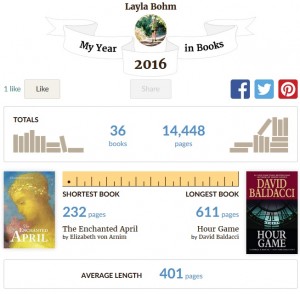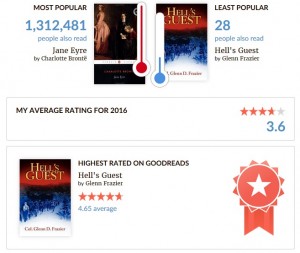To my pleasant surprise, I finished 36 books in 2016. (The number nerd in me liked this, and promptly decided 2017 should have 37 books, but we shall see.) Goodreads tracks this info via a website and a phone app, and while I’m not thrilled with countless time-sucking semi-social sites, I think the site has encouraged me to read more and to stay a bit more organized. The payoff: their year-end “My Year in Books” summary.

Full disclosure: The site doesn’t differentiate between physical, electronic and audio books — and I plowed through a number of audio books in 2016. Am I cheating by including audio books? I’m not sure, but my conscience rests easily if I say I “finished” the books, rather than saying I “read” them. Regardless, I did consume the entirety of each book (including the lengthy end notes in a couple of them).
Of these 36 books, I only gave a full five-star rating to three. Coincidentally, they were either set in the Pacific Northwest or about WWII, which really isn’t much of a surprise.
- The Boys in the Boat, by Daniel James Brown, a well-researched account of poor, hard-working young men from the Pacific Northwest who set out to beat the Ivy League crew teams and then take on the Nazis. I have a life-long fascination with WWII, I didn’t know much about the 1936 Olympics, and I could picture the area.
- Burying Water, by K.A. Tucker, about a woman who was left for dead but survived — with no memory of what happened to her. It wasn’t quite the typical “girl suffers amnesia, falls in love, lives happily ever after” type of plot. The characters pulled me in, and I just wanted the story to keep going.
- The Lost Wife, by Alyson Richman, a story of a young couple who are separated by WWII. The novel switches between his and her perspective, present and past, and somehow it works without confusion.

In no particular order, the four-star books:
- The Long and Faraway Gone, by Lou Berney. Two separate crimes and two separate characters are woven together. I really wanted the story to keep going!
- Happiness For Beginners, by Katherine Center. A light-hearted, funny tale of a newly single woman who has no business signing up for a rugged wilderness survival course.
- Black-Eyed Susans, by Julia Heaberlin. A suspense story of the sole survivor of a serial killer, successfully told in both present day and 20 years earlier.
- The Spy’s Son, by Bryan Denson. Subtitle: “The True Story of the Highest-Ranking CIA Officer Ever Convicted of Espionage and the Son He Trained to Spy for Russia.” I came close to giving this one five stars.
- The Lake House, by Kate Morton. A tale about a missing person. This was a toss-up between three and four stars, but I liked the writing.
- An Irish Country Doctor, by Patrick Taylor. Cute little tale set in the Irish countryside: I was biased because I’ve been there and could picture it, and this was an audio book with a fantastic accent.
- One Plus One, by Jojo Moyes. Good blend of humor, non-cheesy romance and funny characters. Bonus: They’re on a road trip.
- Isaac’s Storm, by Erik Larson. One of my favorite non-fiction authors, Larson brought a 1900 hurricane to life. This was closer to five stars.
- Me Before You, by Jojo Moyes. A young woman takes a job caring for a grumpy man in a wheelchair. Her character is hilarious.
- After You, by Jojo Moyes. Sequel to the above, I continue to like the character. (It helps that she is delightfully British.)
- Jane Eyre, by Charlotte Bronte. I’ve read this book at least once before, but it’s been about 20 years. This was the folding pages version; I am a bad blogger who hasn’t taken a photo of it, but you can buy it here.
- The Diplomat’s Wife, by Pam Jenoff. A WWII story of love and heartbreak, with a plot turn that is a little too far-fetched but made it a good airplane read.
- I Am Malala, by Malala Yousafzai and Christina Lamb. The story of the remarkable teenager who stood up to the Taliban — subtitle: “The Story of the Girl Who Stood Up for Education and Was Shot by the Taliban.”
- The Short Drop, by Matthew FitzSimmons. Another mystery of a long-missing person. Strangely, I read this in July and thoroughly enjoyed it, but I barely remember it.
- Anonymous Sources, by Mary Louise Kelly. When a former NPR reporter writes a crime novel about a reporter, of course I will read it.
- Split Second, by David Baldacci. Two former Secret Service agents team up on a crime case. This is my guilty pleasure reading at its finest.
Moving along to the three-star books:
- Hell’s Guest, by Glenn Frazier. First-hand account from a survivor of the Bataan Death March in WWII, which I finished just before running the marathon that honors the victims. I wanted to love this, but the writing was mediocre and it was a little too preachy. The passion was genuine, though.
- Killing Floor, by Lee Child. Bad writing made tolerable by the audio book factor and the “fun action story with a cool main star so you can suspend all deep thought and just enjoy the ride” notion.
- Seabiscuit, by Lauren Hillenbrand. A well-written, well-researched book about the legendary race horse, which took me a very long time to read because I’m just really not a horse person. (I loved her book “Unbroken,” though.)
- The Girl You Left Behind, by Jojo Moyes. More Jojo Moyes fiction, this time set in WWII. This was more of a 2.5-star book.
- Hour Game, by David Baldacci. The second book in the “King & Maxwell” series about the former Secret Service members turned private investigators.
- Simple Genius, by David Baldacci. The third book in the series. This one’s plot was kind of ridiculous, but I just really get a kick out of the two main characters.
- First Family, by David Baldacci. Fourth book in the series. I often run without music, but when it’s a three-hour run that will get tough, this kind of audio escape is the best.
- The Sixth Man, by David Baldacci. Book number five. More guilty pleasure fun.
- King and Maxwell, by David Baldacci. The sixth, and apparently last, book in the series. Wait, that’s it? No more PI capers?
- The Black Echo, by Michael Connelly. Crime novels by a former LA Times crime reporter: Books I will explore. Harry Bosch, the gritty detective, is my kind of character.
- Black Ice, by Michael Connelly. This one took Detective Bosch into Mexico. I was a bit generous with my stars.
- The Concrete Blonde, by Michael Connelly.I started plowing through these Harry Bosch books because I discovered the Amazon TV series that’s taken from the books. The show is fantastic, but I wanted to read the books before seeing the episodes.
- The Last Coyote, by Michael Connelly. This one explores more of Bosch’s history.
- Trunk Music, by Michael Connelly. I polished off the second season of Amazon’s show, which ended with this book. I have a feeling I’ll binge both when the third season comes out this year.
And then we have the two-star books. Like the five-star ones, I only gave this lower honor to three titles:
- The Rumor, by Elin Hilderbrand. I’ve read a couple of her books in the past and remember liking them, but this one was just too fluffy with zero substance.
- The Heist, by Janet Evanovich. Her books can be fast-read fun romps, but this one was ridiculous to the point of being absurd.
- The Enchanted April, by Elizabeth van Arnim. I really wanted to like this one because it was recommended as an antidote to a book that was miserable. But it was just so slow and seemed to have no point. A guy on an airplane was impressed that I was reading it, so maybe I am just not sophisticated enough for fine literature.
And that last book leads to the one book I abandoned this year. I didn’t give one one star to any books, and I’m really not one to abandon books because it bothers me to leave pages unread, but I finally decided that I simply could not waste my brain cells on a book I hated. The book that gets this rare honor: Alibi, by Joseph Kanon. Another novel set in WWII, this one brings up moral questions that could be good things to think about but instead made me not want to read at all. I’ll be donating this book, which is also rare for me, though I just got the idea to leave it in my unused fireplace for the next tenant who moves in.
And that’s a wrap for 2016 in books. What else should I read, aside from/in addition to the books on this never-ending list?

I think I recommended the Enchanted April. Gutted you didn’t like it! But different books, different people!
I think I am not sophisticated enough for it! Mine is a “New York Review Books” edition, which got the airplane guy’s attention. I, meanwhile, didn’t know anything about NYRB… (This is probably one reason I have not written the book I always envisioned…)
I read a few wwII books this year’s past based on my mom’s Jewish book club recommendation. They weren’t horrible if your interested. You beat me by one book! Great job! Thanks for the list!
Ooh, yes, I’ll have to go look at your book list! I kind of avoided year-end book blog posts until I wrote this one, so now I need to catch up.
Seriously. Audio books are not “cheating.” Shut those lying liars right the eff up. Your brain does not differentiate between info encoded via spoken language & info encoded via written language, so I don’t really see why this is a thing the Book Police get their panties twisted over. Like. How is it even *possible* to cheat at something you do *for fun*???
I’ve actually read none of these so will have to check some of them out!
I have wondered if it’s slightly cheating that I drive or clean my house while listening to a book, and then say I “read” it. But you know a lot about the brain, so I will whole-heartedly agree with you!
Funny enough, I’ve added some of your books to my Goodreads list, but I apparently keep not actually getting to them. But that’s a good problem to have, I think.
ct73w6
ao8bcu